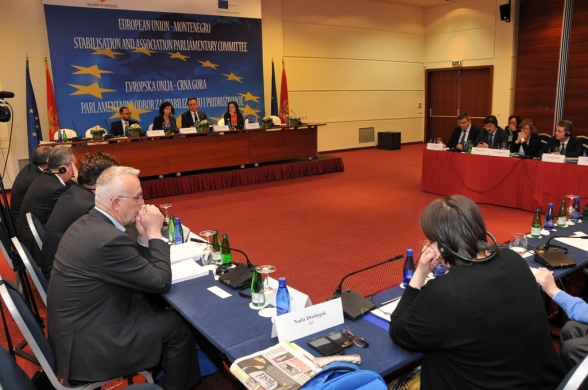On the topic of the position of persons with disabilities in Montenegro and the European Disability Strategy, MEP Mr Mark Plura pointed out that it was very important to adopt and abide by the principles of the UN Convention on Persons with Disabilities, but that it was more important to implement those principles in practice. In that respect, Mr Plura asked the question how the Convention, considering that it had been ratified by Montenegro, was included through Montenegrin laws and how it was being implemented in Montenegro. He evoked the importance of the voting rights of persons with disabilities, and primarily on overcoming the mental, and then the architectural barriers. As a country on its path towards the EU, Mr Plura was convinced that by entering into the process of rapid resolution of the issue of accessibility and availability, Montenegro would get another positive recommendation.
MP Ms Nada Drobnjak pointed out that the status of persons with disabilities, as an especially vulnerable group, was a significant democratic issue. Ms Drobnjak said that Montenegro, as a country which had ratified the UN Convention on Persons with Disabilities, recognised 13 priority institutions which should also be accessible to persons with disabilities. Ms Drobnjak said that, unfortunately, the Parliament of Montenegro had been prevented by the bureaucratic procedures so far, so that only in March this year a Public Notice was issued for adapting the access to Montenegrin Parliament for persons of limited mobility. She also added that adaptation of traffic to persons with disabilities was noticeable in all Montenegrin municipalities. She concluded that changing the cultural context was the most significant thing.
MEPs Ms Petra Kammerevert and Ms Terry Reintke pointed out that it was important to cover this topic in the SAPC, and noted that not even in the EU member states everything was completed or perfect with regard to the adaptation process. They pointed out that the Parliament of Montenegro would play a very important role by promptly resolving this issue.
MP Mr Slaven Radunović said that he agreed that the issue of adapting the access to the building of Montenegrin Parliament must be resolved urgently. He said that Montenegro was in the stage of initial development with regard to adapting the law to persons with disabilities.
MP Mr Milutin Simović said that Montenegro had started to resolve that issue and the he believed that Montenegrin Parliament would be a guide to the others in this process.
In the second part of the conference, on the topic of social politics, employment and economic development, first MP Mr Jozo Radoš estimated that one of the causes of bad social and economic state was poor management of public funds, which, according to him, had led to bad statistical data. He mentioned the unemployment problem in Montenegro, which affected up to one third of young and highly educated people, noting that it was an unacceptable disbalance. On the other hand, he said that the ongoing social and economic processes in Montenegro were encouraging, and he recommended that even better conditions for development of small and medium-sized enterprises should be created.
MP Mr Danko Šarančić said that Montenegro was the only one in the region actively negotiating with the EU. He added that until now the Parliament of Montenegro had adopted eight laws, while the same number of laws relating to the social policy was in the parliamentary procedure. According to him, the priorities of Montenegro were the increase of employment or decrease of unemployment, vocational training and reduction of poverty. He saw the construction of the highway Bar – Boljare as the greatest development opportunity of Montenegro.
MP Mr Mevludin Nuhodžić believes that not even Montenegro had managed to remain immune to the prolonged economic crisis, but he thinks that the concept of the quality of life of the citizens, in addition to social and economic indicators, includes and even broader spectrum of indicators. MP Nuhodžić said that, however, the estimates of the Investment Bank, World Bank and the IMF were encouraging with regard to the process of economic reforms of Montenegro. He pointed out that the capital project in Montenegro was development of the Social Card as the most just system of social welfare. Mr Nuhodžić recalled the opening of the Institute for Social and Child Welfare, the plan of construction of senior homes in Podgorica and Pljevlja, and the existing eleven centres for social services.
MP Mr Koča Pavlović said that employment was an indisputable interest of our society, especially of our young and highly educated people, and added that the IPA 2 was providing a great opportunity for development of small and medium-sized enterprises. MP Mr Milutin Simović also referenced the issue of participation of women in politics, pointing out the importance of political and economic empowerment of women. In that context he cited the example of electoral legislation reform in introducing compulsory quotas in the list of candidates.
At the end of the Conference, a Joint Declaration was adopted.









